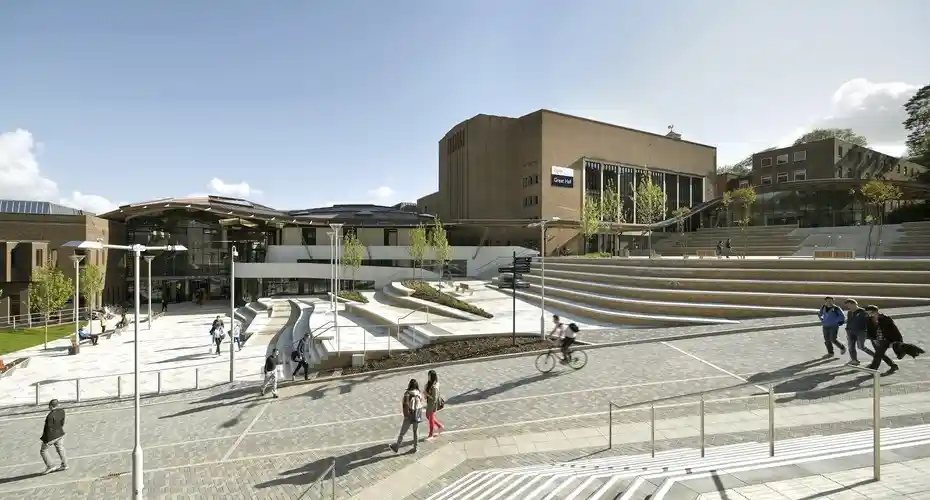| Degrees |
|
|---|---|
| Duration |
| Start date | September or January |
|---|---|
| Locations | Streatham Campus
Penryn Campus St Luke's Campus |
| Study modes | Full time and part time. Split-site research available. |
Overview
Our world-leading Neuroscience research is conducted at the University of Exeter facilities on the Streatham, St Luke’s, and Royal Devon University Hospital Trust campuses with:
- Access to state-of-the-art research facilities including the Mireille Gillings Neuroimaging Centre and Living Systems Institute
- Opportunity to become part of the Exeter Brain Network: An integrated interdisciplinary group of >165 scientists from Psychology, Neuroscience, Biosciences, Computer Science, and Mathematics.
- Experience of research at the cutting-edge of health innovation, making a difference across the World.
- Close-working relationships with the National Health Service (NHS) and the NIHR Biomedical Research Centre, where our research reflects national needs and priorities.
Contact
Phone: 0300 555 6060 (UK)
+44 (0)1392 723044 (non-UK)
Web: Enquire online
Phone: +44 (0)1392 72 72 72
![]()
Top 10 in the UK for our world-leading and internationally excellent Clinical Medicine research
Based on 4* + 3* research in REF 2021
![]()
100% of our health research impact is world-leading or internationally excellent
Research Excellence Framework 2021
![]()
Top 175 in the world for clinical and health
Times Higher Research Excellence Framework 2021 (Education World University Rankings 2023)
![]()
Vibrant and active research student community supported by excellent pastoral and academic staff
![]()
Top 10 in the UK for our world-leading and internationally excellent Clinical Medicine research
Based on 4* + 3* research in REF 2021
![]()
100% of our health research impact is world-leading or internationally excellent
Research Excellence Framework 2021
![]()
Top 175 in the world for clinical and health
Times Higher Research Excellence Framework 2021 (Education World University Rankings 2023)
![]()
Vibrant and active research student community supported by excellent pastoral and academic staff
Research Overview
As a postgraduate student undertaking postgraduate research in Neuroscience in the Department of Clinical and Biomedical Sciences, you will be part of a thriving research community, benefiting from expert supervision as well as access to outstanding facilities. Our progressive research is underpinned by our current expertise in neurogenomics, neurodevelopment and stem cells, neurophysiology, neuroendocrinology, and clinical and cognitive neuroscience, as well as cutting-edge innovation in technology.
Our research delivers direct benefit to patients, the NHS and the pharmaceutical industry.
Supervision
You can expect:
- High-quality research supervision to develop and nurture your potential
- A tailored supervision approach to help best suit your requirements
- Accessible supervisors who are enthusiastic about working directly with postgraduate research students
- Regular timetabled meetings with your supervisor
- 'Open door' policy to all postgraduate students - instant access to world-leading researchers who will share their expertise and ideas with you
- Regular meetings with your supervisory team, other members of your research group, and mentors
You will only be able to pursue a research degree with us if we can offer appropriate supervision. Your supervisors will provide the necessary support and guidance and so need to have expertise in your chosen research field. You may join a research team or work with specific members of staff.
You should informally approach your potential supervisor(s) with your research proposal before submitting a formal application to study. This will enable you to find out if they feel they would be able to supervise you and whether they believe your research proposal needs further refinement.
Entry requirements
Applicants will typically hold (or be expected to attain) a First-Class or Upper Second-Class BSc degree and/or an MSc in a relevant subject (or equivalent qualifications from other countries).
Relevant clinical or professional experience may be taken into consideration as evidence of equivalency. However, specific requirements may vary, and prospective applicants should contact the team via our enquiry form.
English language requirements
International students need to show they have the required level of English language to study this course. The required test scores for Neuroscience is Profile B2.
Please visit our English language requirements page to view the required test scores and equivalencies from your country.
How to apply
If you are applying for a funded PhD studentship, please follow the specific instructions related to that application.
The information below applies to self-funded PhD, MPhil and Masters by Research applicants.
- Pinpoint your PhD research area.
- Investigate whether this area is available at Exeter.
- Ensure that you meet our English language entry requirements (international students only).
- Approach your potential supervisor(s) and confirm that they are willing to support your application.
- In consultation with your potential supervisor(s) construct and refine your PhD research proposal.
- Apply online
PhD studentships pages can be accessed in our Funding lists on Finance tabs under each research topic page, and are also available from the Postgraduate Research search results pages on this site, on the PhD projects tab.
Full details of the application process can be found on our apply now webpage.
Fees and funding
Tuition fees per year 2025/26
- Home: £5,006 full-time; £pro-rata part-time
- International: £28,600 full-time
For those studying for more than one year, our fees are expected to increase modestly in line with Consumer Price Inflation measured in December each year. More information can be found on our Student Finance webpages.
Tuition fees per year 2024/25
- Home: £4,786 full-time; £pro-rata part-time
- International: £27,500 full-time
For those studying for more than one year, our fees are expected to increase modestly in line with Consumer Price Inflation measured in December each year. More information can be found on our Student Finance webpages.
Our Postgraduate Funding webpage provides links to further information. If you are considering a PhD in the future, in addition to University of Exeter funding, we have been successful at securing postgraduate funding for PhD research through our Funded Centres.











